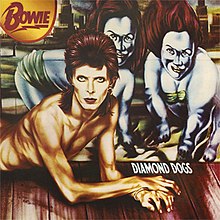
Back Diamond Dogs Czech Diamond Dogs (Album) German Diamond Dogs Spanish سگهای الماسی Persian Diamond Dogs Finnish Diamond Dogs French Diamond Dogs Galician Diamond Dogs HE Diamond Dogs Croatian Diamond Dogs Hungarian
| Diamond Dogs | ||||
|---|---|---|---|---|
 | ||||
| Studio album by | ||||
| Released | 24 May 1974 | |||
| Recorded | January–February 1974 | |||
| Studio |
| |||
| Genre | ||||
| Length | 38:25 | |||
| Label | RCA | |||
| Producer | David Bowie | |||
| David Bowie chronology | ||||
| ||||
| Singles from Diamond Dogs | ||||
| ||||
Diamond Dogs is the eighth studio album by the English musician David Bowie, released on 24 May 1974 through RCA Records. Bowie produced the album and recorded it in early 1974 in London and the Netherlands, following the disbanding of his backing band the Spiders from Mars and the departure of producer Ken Scott. Bowie played lead guitar on the record in the absence of Mick Ronson. Diamond Dogs featured the return of Tony Visconti, who had not worked with Bowie for four years; the two would collaborate for the rest of the decade. Musically, it was Bowie's final album in the glam rock genre, though some songs were influenced by funk and soul music, which Bowie embraced on his next album, Young Americans (1975).
Conceived during a period of uncertainty over where his career was headed, Diamond Dogs is the result of multiple projects Bowie envisaged at the time: a scrapped musical based on Ziggy Stardust (1972); an adaptation of George Orwell's novel Nineteen Eighty-Four (1949); and an urban apocalyptic scenario based on the writings of William S. Burroughs. The title track introduces a new persona named Halloween Jack. Belgian artist Guy Peellaert painted the controversial cover artwork depicting Bowie as a half-man, half-dog hybrid, based on photos taken by photographer Terry O'Neill.
Preceded by the lead single "Rebel Rebel", Diamond Dogs was a commercial success, peaking at number one in the UK and number five in the US. It has received mixed reviews since its release, many criticising its lack of cohesion; Bowie's biographers consider it one of his best works and, in 2013, NME ranked it one of the greatest albums of all time. Bowie supported the album on the Diamond Dogs Tour, which featured elaborate and expensive set-pieces. Retrospectively, Diamond Dogs has been cited as an influence on the punk revolution in the years following its release. It has been reissued several times and was remastered in 2016 for the Who Can I Be Now? (1974–1976) box set.